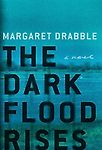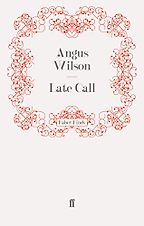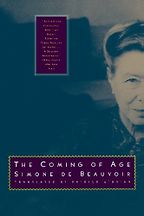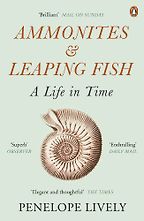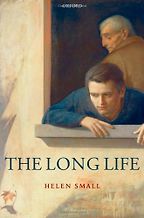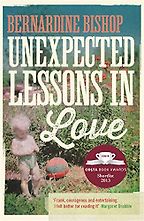You’ve chosen five books on ageing. First of all, we should clarify ‘ageing’ and ‘age’ — when do you think the process of ageing begins? How old is ‘old’?
We’re ageing all our lives. I suppose at 70, you begin to think you’re getting towards ‘age,’ but, of course at 70, people are quite lively—I felt perfectly lively at 70. And then at 74 or 75, I began to feel not quite as young as I was, and definitely at 80, one cannot but say that one is old. So I think from 70 onwards.
Do you think that we should read these five books that you’ve chosen when we ourselves are in our seventies and growing old, or should we start thinking about ageing when we’re much younger?
I don’t think you need to wait — I read Angus Wilson’s Late Call when I was very young, and I thought it was an absolutely wonderful description of an ageing woman, and very sympathetically done. I think that one should certainly read the ones with a more philosophical take on it when younger, because they give you a longer perspective. Then there are some books that one wouldn’t be so interested in when young, I think, but it’s good to look ahead. It’s good to have good images of good ageing.
What made you pick up Late Call by Angus Wilson when you were younger?
I love all his works. He usually has middle-aged, male protagonists of the upper-middle classes, and here, suddenly, you come across this ageing hotel manageress in her sixties who’s just retired. It is a completely sympathetic portrait of her giving up her job and moving in to live with her widowed son in a ‘new town.’ It is absolutely thrilling, the perspective of an older woman—she was a lot older than I was when I read it—coming to terms with a completely different life. There are the things she’s cross with, the things that bore, and the things she can’t manage — like the timer on the cooker. It is also a very brave book. You see how she’s absolutely determined to make the best of her life, despite the family problems around her.
Do you think that moving house and all that that entails is something a lot of old people have to face? They quite often have to move—sometimes into an old age home.
They do. Or they have to downsize or move in with their family. At the end of this book, Sylvia moves out again—she’s had enough of it. But because her son is widowed, she’s going to look after the grandchildren a bit. It does make the point that you need your own territory. How a middle-aged gay man knew about all that, I don’t know, but he does it very, very sympathetically.
The book is set in a fictional post-war new town. Do you think there’s an optimistic metaphor here, about a new start in a new town, even at this late stage of life?
It’s interesting. It is one of the only novels that I know that is set in a new town—it’s not been a very good terrain for novelists. Angus obviously did a lot of research—I think it was a cross between Milton Keynes and Harlow. I’ve been fascinated by both those landscapes myself: the bits of them that do work and the bits of them that don’t.
So I do think it is about a new start in a new town, and grafting the old onto the new. I found that a very good metaphor for beginning again. And he’s very perceptive about new town architecture—the odd church, and the fountain in the shopping centre.
I wonder what metaphor one would choose today, now there aren’t any new towns being built.
In the novel, Sylvia gets into a tremendous tangle with the central heating in the new house and with the automatic timer on the cooker. In my novel—The Dark Flood Rises—I’ve got a scene where one of my ageing characters is completely unable to control the DVD recorder. That is just like me. The new technology is all telephones and IT and so on. These challenges are worse now than they were in the 1960s and ’70s, and they make you feel old.
One of the things I loved about your book was the way that your main protagonist, Fran, texts her friends and children all the time. You feel that the technology is her friend, it’s empowering, it helps her keep up these relationships.
She’s very good at texting, yes.
Do you think that, as well as sometimes being bewildering, the abundance of technology today can be a good thing for older people?
It is both. For instance, I have found my e-reader to be a great blessing. It is so wonderful to have all those books in your bag all the time and to be able to buy a new one whenever you feel like it. It’s wonderfully convenient. I usually buy the newspaper [in hard copy], but when I’m abroad, I buy it online. It is wonderful just to be in your hotel bed in the middle of nowhere and get the morning paper. And a lot cheaper too.
I wonder how Angus Wilson’s Sylvia would have coped with mobile phones.
There seems to be a kind of universal access to mobile phones, so I think Sylvia would have been fine. In fact, it’s quite interesting that the automatic timers on the ovens aren’t nearly as popular as they used to be because they’re a nuisance. The mobile phone is really useful, whereas the automatic timer was never very useful because it ruined your food. The things we need, we learn to use.
Your next choice is Old Age by Simone de Beauvoir [La Vieillesse, also published in English under the title The Coming of Age]. Why did you choose this one?
This is a great classic work on the subject. She wrote it after she wrote The Second Sex. That was a huge survey of gender inequality, and women’s position in the workforce and sexually and so on. Old Age is a huge survey of the state of old age. It hadn’t been done before. There was some stuff from classical literature, but there wasn’t a contemporary survey. Some of it has dated because it’s to do with France in the 1960s and ’70s, but some of it is as relevant as it always was.
How do you think society’s treatment of the elderly has changed since 1970, when it was written?
We still treat old people quite badly, but we live longer, so the problems have changed.
She describes how the disadvantaged poor are put in really unpleasant care homes. Exactly that still goes on. People who haven’t got money to look after themselves tend to end up being abused by the state system, which is shocking. The investigations of care homes have been very revealing. None of that has changed, really. There are always people being abused, and now there are more of them to be abused.
“In a way, since Beauvoir’s day, things have got worse”
In a way, since Beauvoir’s day, things have got worse. We have always prided ourselves on our National Health Service, although the French have one too. Every country has a different system, but I think neither France nor England treat their old people terribly well. Italy is probably better. Cultures where there’s more family living together in old age are better for older people, but not necessarily for their children. It’s hard.
It’s a very political book; de Beauvoir is a very political writer. Do you think how we look after the elderly as a society is a potent political subject?
It certainly is. De Beauvoir tries to address it in her time, and she also tries to address subjects like euthanasia and assisted dying. France is nominally a Catholic country, so some things were different there. In this country, I deplore the attitude to assisted dying because we know that 80 per cent of people would vote for it. But the people who vote against it have the power.
Your next book, Ammonites and Leaping Fish, I absolutely loved. It’s a much sunnier portrait of old age. What are some of the positives that Penelope Lively sees in getting old?
I love the way she goes on being curious about life. She cherishes the books she’s read, and she goes on reading. She is realistic, which Simone de Beauvoir wasn’t. Simone de Beauvoir was angry about ageing, whereas Penelope is more gracious. She makes the best of things. She does the bits of gardening she can do and doesn’t weep over the bits she can’t. She cherishes the objects that remind her of moments in her life that have been very valuable to her.
On the whole, she hits a note of happy stoicism: This is how it is. I’m in another chapter of my life now. She doesn’t pretend. Neither Beauvoir nor Lively pretend at all about old age, but Penelope Lively has a happier attitude. A lot of the things she enjoys are still with her. I can’t remember what she has for breakfast now, but it is something rather nice. Has it got a spoonful of honey in it? She values the moments in her day, as I do: the moments in the day when you feel that, really, this is as nice as it always was.
She writes about taking an almost childlike joy in the new pleasure of old experiences, which I thought was really special. Also, the pleasures of having children and grandchildren…
There’s a very nice bit where one of her grandchildren gets a typewriter. They all laugh about going to granny for technological advice. But her fingers remember exactly how to do it. I thought that was very nice, the idea that certain memories don’t go away—and that there are some things you can do that younger people can’t.
She says memory is a kind of triumph over time. Do you think memory, and memories, are crucial to surviving old age?
Absolutely, a Proustian ‘time regained.’ But then one has to recognise that some people lose their memories. Penelope didn’t, but Iris Murdoch, for instance, did. It’s a blessing when you have your memories intact and can enjoy them.
I do say to myself, sometimes, when I’m groaning and moaning about this and that: ‘Why don’t I try and think of all the good things that have happened instead of worrying about missing the train tomorrow?’ It sometimes works. I’ll go back to that place where we had such a lovely time and revisit it in my memory. As Penelope says, your memory bank fills up. So it is a pity if you can’t find something good to remember.
Towards the end of the book, Penelope Lively writes about certain special objects, which remind her of particular moments of life. This reminded me of a bit in your new novel—your character Poppet has her box of treasures, even though she is not old, she’s young. Do you think we should start accumulating treasures now for old age?
I think we all do, if not intentionally. We have things that remind us of who we were or who other people were, things that, for some mysterious reason, we’ve never thrown away. They become more precious because they’re salvaged.
The little baby Jesus that Poppet made when she was at school was, in fact, made by my son Joe. It is not quite as described, but it is absolutely adorable, and it is in a little silver box in my bedroom. It is a miracle that this little thing made at school has survived. Whenever I look at it, which I sometimes do, it takes me back to when they were at primary school and just little things. And that’s happy.
Not the terrible nights when they were all ill and not sleeping…
No, all those disappear. One just remembers the good times we had.
Your fourth choice is The Long Life by Helen Small. What appeals to you about this book?
I love the way it attacks the whole subject. It’s the first really serious book since de Beauvoir. There are lots of self-help books about growing old, but what Helen Small does is look at the whole history of attitudes towards age and death since Greece and Rome.
I love the stuff about Priam dying, at the end of a very long life, completely horribly. Does that undo the value of the happy life he had as King of Troy? I find that philosophical question, about which bit of your life has value, very, very interesting. And Aristotle and ‘Intention’ — whether our life has intention, a journey towards a goal.
In your novel, you write a bit about Jimmy Savile. You ask, very philosophically, if there was some kind of foreshadowing, during his life, of the shame that was to come after his death.
That was totally based on Helen Small. Does posthumous disgrace devalue your earlier life? The answer is that it probably does. Whereas, in Priam’s case, he didn’t do anything disgraceful, he just got killed in the siege of Troy when he was very old. I certainly thought about Helen Small’s big questions about the value of life.
“Writers who have dwelt a lot on death don’t necessarily die young themselves”
I was also fascinated by what she writes about Samuel Beckett, who wrote a lot about ageing. I was talking to a friend about this yesterday: Why was it that Beckett, who lived until he was in his eighties, was always so afraid of death, and always foreseeing his death?
What did you come up with?
Nothing. I think it was something to do with his mother, but I honestly don’t know. I just find it really interesting that writers who have dwelt a lot on death don’t necessarily die young themselves. They’re just prolonging their own misery by starting to worry about it when they’re in their twenties.
Another philosophical point you make in your own novel is that the alternative to ageing—dying young—isn’t so good.
Yes, other ways to go aren’t so good. I remember my friend Bernadine Bishop, who wrote the last of my choices, saying: ‘I’m too old to die young, and that’s good.’ And I thought that was a very philosophical attitude to take.
Going back to Small’s book, do you feel that those big, ancient, philosophical questions remain relevant today?
I do think those big questions remain fascinating, even though we live in a time when the life span has changed. As one lives, one has some sense of a destination. However falsely one’s life is prolonged, one still has a sense of life as an onward journey — or at least I do. Some of the ancient philosophers believed this was a proper model of life.
Now you get the idea that your last years are likely to be ill health and amnesia. Your last ten years, medically prolonged, are going to be bad. So the philosophical question of when it’s the right moment to die is a huge one now. And it is a philosophical question, not a medical question, because medics can go on keeping you going long after you have any quality of life.
I noticed that Desmond Tutu and George Carey—both of them bishops—have come out in favour of assisted dying, which they weren’t when they were younger. That’s a religious, philosophical shift.
There was a chap called Ezekiel Emanuel who wrote an article in The Atlantic. He said that 75 was quite old enough. After the age of 75, you shouldn’t take any steps to prolong your life medically. I think that 75 is a bit early. I mentioned this to a friend of mine, and she said, ‘But I wouldn’t have written my best book then!’ She wrote her best book when she was in her late seventies. So the idea of the right time to die is moveable.
De Beauvoir writes about ageing being a degrading thing; maybe that’s one of the arguments in favour of assisted dying. Do you think ageing has to be degrading, or could it not be?
That is such a difficult question. I’m going to say that ageing is okay if you look like Joan Bakewell. It is OK if you feel like Joan Bakewell and have her energy and her work ethic and all the rest of it. But it is not okay if you’re sitting in a care home and can’t get out of your chair. That’s not so good. That is degrading. Fran—the protagonist of my new novel—is into making people as comfortable as they can be, but that doesn’t conceal the fact that some people can’t be very comfortable. It is a big question.
Your final book is Unexpected Lessons in Love by Bernardine Bishop. What can this tell us about ageing?
It is really an extraordinary story. Bernardine was exactly my age; we were at Cambridge together. Shortly after leaving she published two novels. She published earlier than I did, which she was sometimes keen to point out to me. I went on being a novelist, but she stopped and had other careers.
But when she was in her seventies, she developed cancer and had to give up her practice as a psychotherapist. She decided that she’d ‘just write some novels’, and she did, and they are very, very good. She found a whole second self. In those last three novels she wrote, she was just writing for the joy of writing. She returned to her first love and was happy doing it.
I read this novel before it had a publisher, and I absolutely loved the way she remembered what it was like holding a baby when she was a grandmother, and the cat. The cat and the baby are just so wonderfully done. Their reactions to each other are so charming.
The novel’s main character makes a new friend at the colostomy clinic.
I thought that was brilliant.
So can old age be a good time to start new friendships?
I think one can make close, new friends in old age. In the novel, they become very good friends through their medical problem. It’s quite a common way of meeting somebody — in a hospital waiting room. I have made one or two good new friends of roughly my own age: people who’ve written to me, and one slightly younger friend who takes me for walks in Somerset. He is very sweet, he holds my hand in case I fall on the rocks. We have a shared interest in the seashore. I wrote to him and said I needed to do some research about it. So I’ve found a friend who absolutely loves going with me. You can make a good new friend if you have a common interest — it needn’t be illness, but it could be.
In your novel, you write about Fran’s ‘new-old’ friend. Can old age also be a time of rediscovering your old friends?
It can happen. You’re very busy in your middle life, you don’t have time to see some of the friends you made when you were young. Then, when you all retire and get older, you’ve got time again and you go on little outings, even abroad. When people are ageing, they often remember their childhood very vividly. This year, I went to Genoa and Turin with two old school friends and we had a great time, even though I don’t see them regularly. It is just that we are now free to go on a little spree. That’s very nice.
One of the real silver linings of your novel is the idea of there being some kind of afterlife in one’s work. There’s that very touching moment when Josephine is researching an obscure novelist and comes across a reference to the novelist’s son in another book, and she puts the two books beside each other on the bedside table, and says that mother and son can whisper to each other from the afterlife of letters. Do you think there is such a thing as the afterlife?
I don’t, except in the way that you’ve just mentioned. There’s an afterlife in that books go on, and are read for very strange reasons, sometimes. Jo reads these obscure books and gets a lot of pleasure out of them. The authors wouldn’t have expected them to have survived for so long. You can never tell.
Another character finishes a friend’s tapestry. I finished my father’s tapestry, which he was doing when he was dying. I’ve still got the cushion that it’s on. So there is something about finishing things and ongoing life. Even the objects that I’ve made—and I’m not very good at making things for the house—do go on. As Penelope Lively says, the objects have their own history, and books obviously have more history than a cushion. You never know who’s going to remember what’s in them.
It’s exciting to think that writers like Angus Wilson, who are currently quite overlooked, could have a resurgence, largely thanks to people like you writing about him.
He is a wonderful writer and still has devoted fans like Rose Tremain, who talk and write about him. People who really admire his work go on admiring it, and there might well be another wave of admirers. It‘s interesting when things get lost and are then recovered. Did you ever read that book Stoner? That disappeared, then it was rediscovered and had a whole new vogue.
Can you offer any words of advice about how to age well?
I don’t know whether to go for the sublime or the ridiculous! Here’s the ridiculous: Don’t die falling down the stairs; always hold the banister. That was advice given to me a month or two ago by a good friend of mine, who’s in his eighties now. He and his wife watch 24 Hours in A&E, and he says that everyone over seventy is in there because they’ve fallen off their bicycle or fallen down the stairs. There are certain things that it’s just not sensible to risk.
More sublimely, I think learning a new language is good. It’s slightly better for the brain than crossword puzzles, but it also teaches you a new world. I’m learning German poetry with a PhD student. We don’t do language—I don’t want to go shopping in Germany—but we read poems together, and that has given me great joy. It’s like entering into a new world that I knew was there but had never had the time or inclination to enter.
Five Books aims to keep its book recommendations and interviews up to date. If you are the interviewee and would like to update your choice of books (or even just what you say about them) please email us at [email protected]
Five Books interviews are expensive to produce. If you've enjoyed this interview, please support us by donating a small amount.

